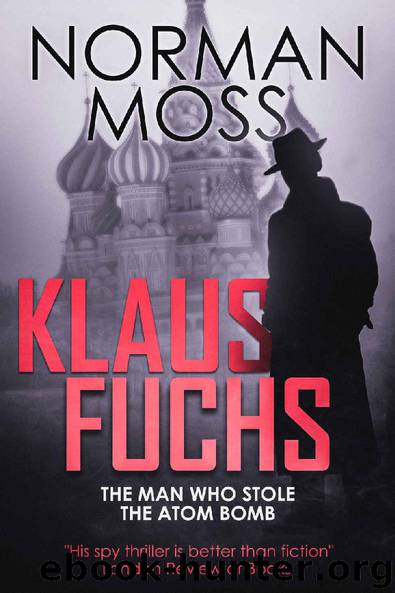Klaus Fuchs: The Man Who Stole the Atom Bomb by Norman Moss

Author:Norman Moss [Moss, Norman]
Language: eng
Format: epub
Publisher: Sharpe Books
Published: 2018-10-14T22:00:00+00:00
Chapter Five
The trail of suspicion that led to Fuchs began at Fort Meade, Maryland, a sprawling army camp situated roughly midway between Baltimore and Washington that was then the headquarters of the US Army Signal Corps. In the late 1940s, a special unit of the Signal Corps was operating behind a perimeter fence within the camp, in a cluster of buildings sprouting a baroque forest of aerials. This unit was intercepting messages sent by foreign governments, and decoding them. It was the predecessor of the National Security Agency, the agency for worldwide electronic eavesdropping that was established in 1952.
The Signal Corps had been intercepting messages between Soviet diplomatic missions in the United States and Moscow during World War II; the messages they intercepted were in code and they could not decipher them. But they kept them anyway, and the coded messages remained in the files, like packages waiting to be opened one day.
The means to open them came in the late 1940s with the discovery of some Soviet coding devices, which enabled cryptograph experts in America and Britain, working laboriously, to decode some Soviet messages. Decoders at Fort Meade applied these to messages that were currently being intercepted, and then to past messages in their files.[18]
Going through these, they found a message sent from the Soviet consulate in New York to Moscow in 1944 which, once decoded, seemed to concern atomic energy and a British scientist. It was given to the FBI, and also to the intelligence officer at the British Embassy in Washington, who passed it on to MI5.
The head of MI5’s counter-espionage branch, Dick White, took it to one of the heads of the atomic energy programme, Michael Perrin (now Sir Michael), who held the title of Deputy Director, Technical Policy. Perrin was a chemist who had come over to Tube Alloys from private industry during the war. He studied the message as decoded, and told White that it seemed to him to indicate that one Klaus Fuchs had given some information to the Russians while he was working on the atomic bomb project in New York.
This was in August 1949, and from then on Fuchs was under surveillance. MI5 put a tap on his telephone and intercepted his mail. Arnold was told. Meanwhile, MI5 analysed the message further, examining its context, and traced the movements of other British scientists who were working in New York. This process eliminated other suspects and pointed more clearly to Fuchs.
Perrin told the head of the atomic energy programme, the former RAF chief, Lord Portal of Hungerford, that there was now some doubt about Fuchs’s loyalty. He also told the chief civil servant at the Ministry of Supply. He told Sir John Cockcroft, and Cockcroft’s response was characteristic of his anxiety to avoid unpleasantness. He held up his hand and said to Perrin, ‘Don’t tell me any more! Thank God I’m sailing to America on the Queen Elizabeth tomorrow, and I can’t be got at.’
A few days after this, in the early
Download
This site does not store any files on its server. We only index and link to content provided by other sites. Please contact the content providers to delete copyright contents if any and email us, we'll remove relevant links or contents immediately.
| Africa | Americas |
| Arctic & Antarctica | Asia |
| Australia & Oceania | Europe |
| Middle East | Russia |
| United States | World |
| Ancient Civilizations | Military |
| Historical Study & Educational Resources |
Red Famine: Stalin's War on Ukraine by Anne Applebaum(2929)
Midnight in Chernobyl by Adam Higginbotham(2541)
Chernobyl by Serhii Plokhy(2535)
Midnight in Chernobyl: The Untold Story of the World's Greatest Nuclear Disaster by Adam Higginbotham(2226)
The House of Government by Slezkine Yuri(2200)
Red Shambhala by Andrei Znamenski(2193)
The Gulag Archipelago (Vintage Classics) by Aleksandr Solzhenitsyn(2096)
Red Notice by Bill Browder(2070)
All the Kremlin's Men by Mikhail Zygar(2064)
From Cold War to Hot Peace by Michael McFaul(2029)
Putin's Labyrinth(2016)
From Russia with Lunch by David Smiedt(1971)
The Future Is History by Masha Gessen(1904)
A People's Tragedy by Orlando Figes(1864)
The Romanovs by Simon Sebag Montefiore(1820)
How to Tame a Fox (and Build a Dog): Visionary Scientists and a Siberian Tale of Jump-Started Evolution by Lee Alan Dugatkin & Lyudmila Trut(1770)
Putin's Labyrinth: Spies, Murder, and the Dark Heart of the New Russia(1752)
The Lost Spy by Andrew Meier(1745)
Art and Revolution by John Berger(1721)
